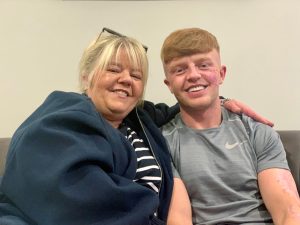
“I just remember there being loads of doctors and nurses around. My mum came in and from what she was saying, it sounded like her last words to me.” That’s how Kai Cochrane recalls the terrifying moment his life was hanging in the balance.
What began as back pain during a work shift in 2022, when he was just 17, turned out not to be a cold as he first thought, but the onset of Meningitis which triggered life-threatening Sepsis.
Meningitis is an inflammation of the protective membranes surrounding the brain and spinal cord. It can lead to Sepsis, a severe and often fatal reaction to infection, where the immune system attacks the body’s own organs and tissues. Symptoms of Sepsis include high temperature, confusion, cold hands and feet and sometimes a rash that does not fade under pressure. Recognising the signs and seeking urgent medical help is vital, as both conditions can develop at alarming speed.
Now 21, Kai vividly recalls his gruelling ordeal. He suffered multiple organ failure, spent 11 days in Intensive Care and eight weeks in total in the Ulster Hospital as doctors fought to save his life.
“I remember leaving work that night with a sore back. When I got home, I started vomiting and sweating. I thought going to bed would help. I noticed a bit of a rash but I did not think much of it. The next morning my mum saw I was covered in a rash and phoned for an ambulance. I woke up in ICU and was told I had Sepsis. At 17, it was very hard, I could not even lift a drink to my mouth or go to the toilet without help. It was during COVID so my Mum could only visit for a short time each day.”
The severity of the infection left lasting scars. Sections of Kai’s skin, including parts of his face, turned black. Kai added, “My skin was raw and I panicked when I saw it. When I left hospital, I did not go out for a long time. People asked me if I had been in a fire. But the Nurses who cared for me every day were exceptional. Over time you just learn to live with the scars.”
Recovery was a long and painful journey. Kai had to relearn how to walk after losing all muscle strength.
Kai said, “You think walking will be easy, you have been doing it your whole life but even getting out of bed was a struggle. My mum was amazing. She washed and dressed me, cut my hair, brushed my teeth, she did everything for me.”
Despite everything, Kai has shown remarkable resilience. Today, he plays football with his brothers for Bryansburn Rangers Football Club in Bangor and enjoys going to the gym.
Kai remarked, “I know I am very lucky to be here and very lucky not to have lost a limb. My advice is simple – act fast. If I had gone to hospital when I first started being sick, I could have avoided what happened. I am just grateful that I survived.”
Kai’s Mother, Sylvia Barnes, still struggles with the memories. Sylvia explained, “When I got to the hospital it was horrific. Kai was my baby and I begged staff to do everything they could. They fought for him day and night. When I was allowed to see him, Kai said, ‘Mum, are you in to say goodbye to me? I am dying, aren’t I?’ Hearing your 17-year-old say that is devastating. I told him, ‘No, you have to fight this to stay with me.’
“The hospital staff were incredible. Consultant Plastic Surgeon, Sandra McAllister has been amazing and Kai has come on so much. His story deserves to be told, if it saves even one life by helping someone recognise the symptoms, then that is something.”
Sylvia describes her youngest son simply as her hero, “Kai is amazing. He fought with everything he had to stay alive.”
Highlighting the importance of awareness, South Eastern Trust Consultant in Emergency Medicine, Dr Conor O’Toole, stated, “Sepsis occurs when the body’s immune system has an extreme response to an infection, damaging tissues and organs. It is a serious condition that requires emergency treatment due to the risk of organ failure.
“The symptoms can include feeling cold, shivering, cold hands and feet, a mottled or ashen appearance and reduced urine output. Patients undergoing chemotherapy or biological treatments are particularly at risk, as infections can be more severe in these groups.
“Early treatment of Sepsis is vital to protect organs and prevent lasting damage that may require intensive care.”




